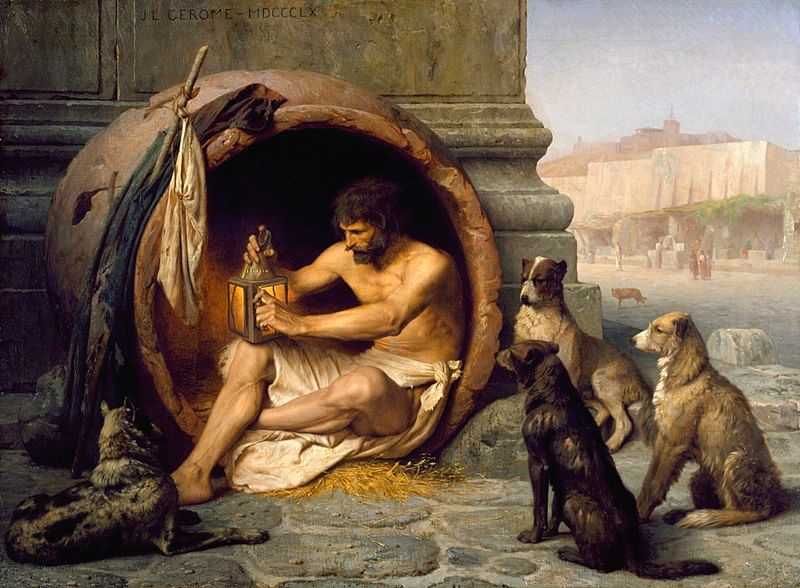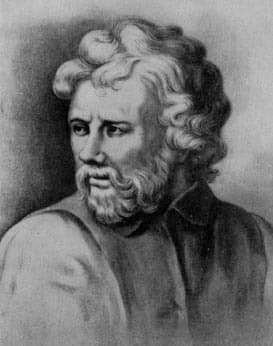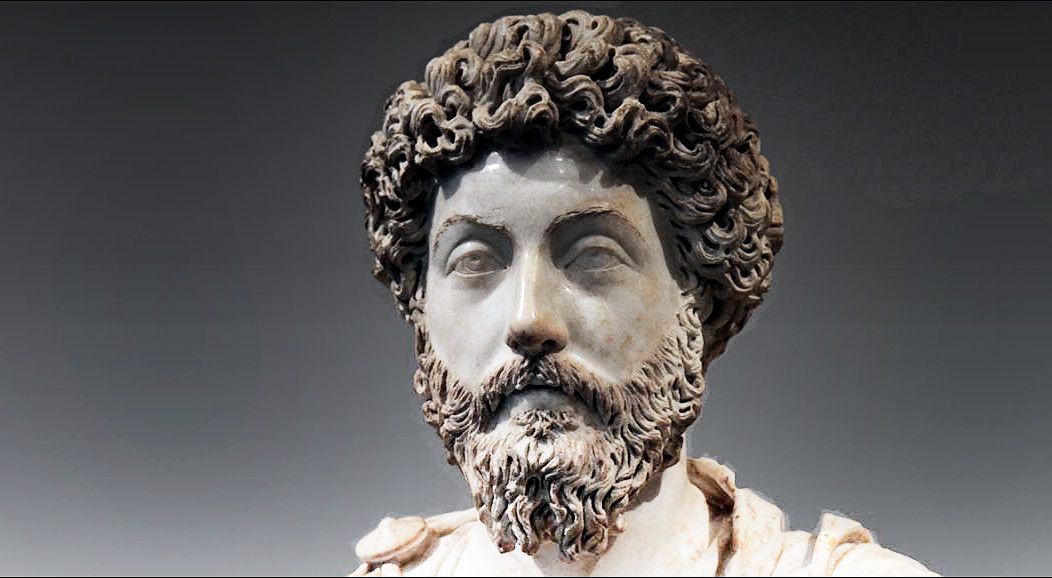Jordan Bates • • 7 min read
47 Ancient Stoic Truth-Missiles to Obliterate Your Victim Mentality

“Of what use is a philosopher who doesn’t hurt anybody’s feelings?”
— Diogenes of Sinope, ~412BC – 323BC
Let’s drill straight to the heart of the matter: The ancient Stoics were fucking badass motherfuckers.

Many of these guys dealt with hardship the likes of which our pampered Internet-age asses can scarcely fathom: deaths of several of their own children, being born into slavery, getting exiled for their viewpoints, being crippled, being sentenced to death, voluntarily living in poverty, and so on.
As a result, their words carry serious weight: These guys weren’t philosophizing from the comfort of a villa jacuzzi in the south of France; they were “philosophizing with a hammer” from the trenches of deep human suffering.
This makes them all the more gripping and potent to read. And it makes it all the more astonishing that in spite of their circumstances, the Stoics celebrated life, cultivating joy, tranquility, and superhuman resilience.
To give you a soul-fortifying cocktail of ancient Stoic badassery, I’ve assembled this list of 47 of their most legendary aphorisms.
Allow these archaic darts of ass-kicking wisdom to pierce your 21st-century narcissistic ‘poor me’ mentality and strengthen your mind and spirit.
47 Ancient Stoic Quotes to Fortify Your Mind and Soul
Diogenes of Sinope (~412BC – 323BC)
Diogenes is probably my favorite ancient Greek philosopher; he was technically a Cynic, a precursor to the Stoics—deal with it.
This grizzly fella voluntarily led an ascetic life of extreme deprivation, living without a home, in the streets, cloaked in rags, eating and drinking only what was necessary. He did this to strengthen his mind and spirit.

As a testament to his raw soul-power, he managed to live to the ripe old age of ~89 in the days before Jesus Christ, and he had one hell of a sense of humor. Listen:
“Alexander the Great found the philosopher looking attentively at a pile of human bones. Diogenes explained, ‘I am searching for the bones of your father but cannot distinguish them from those of a slave.’”
“Dogs and philosophers do the greatest good and get the fewest rewards.”
“He has the most who is content with the least.”
“I threw my cup away when I saw a child drinking from his hands at the trough.”
“Man is the most intelligent of the animals — and the most silly.”
“[Diogenes] believed hunger to be the best appetizer, and because he waited until he was hungry or thirsty before he ate or drank, ‘he used to partake of a barley cake with greater pleasure than others did of the costliest of foods, and enjoyed a drink from a stream of running water more than others did their Thasian wine.’”
— William B. Irvine, A Guide to the Good Life
“It is the privilege of the gods to want nothing, and of godlike men to want little.
“I am a citizen of the world.”
“The foundation of every state is the education of its youth.”
“It takes a wise man to discover a wise man.”
“Poverty is a virtue which one can teach oneself.”
“No man is hurt but by himself.”
“And when asked what he had learned from philosophy, Diogenes replied, ‘To be prepared for every fortune.’”
— William B. Irvine, A Guide to the Good Life
Epictetus (50AD – 135AD)
Epictetus spent his childhood as a Roman slave, and he lived (most of) his life with a completely disabled leg, which was either disabled at birth or broken beyond repair by his slave master.

Dude had it rough as fuck. And yet, in spite of his unfortunate circumstances, Epictetus celebrated his life, penned the remarkable Enchiridion, and went on to become one of the most popular and sought-after philosophers of his time. Yep, it’s safe to say he was a Soul Beast. Look:
“No man is free who is not master of himself.”
“Men are disturbed not by things, but by the view which they take of them.”
“Make the best use of what is in your power, and take the rest as it happens.”
“It’s not what happens to you, but how you react to it that matters.”
“He is a wise man who does not grieve for the things which he has not, but rejoices for those which he has.”
“If you want to improve, be content to be thought foolish and stupid.”
“Wealth consists not in having great possessions, but in having few wants.”
“Don’t explain your philosophy. Embody it.”
“The key is to keep company only with people who uplift you, whose presence calls forth your best.”
“Any person capable of angering you becomes your master; he can anger you only when you permit yourself to be disturbed by him.”
“There is only one way to happiness and that is to cease worrying about things which are beyond the power or our will. ”
“Man is not worried by real problems so much as by his imagined anxieties about real problems.”
“He who laughs at himself never runs out of things to laugh at.”
Seneca the Younger (4 BC – AD 65)
Seneca is one of the most well-known Stoics, and with good reason. A kind of renaissance man of ancient Rome, he was a philosopher, statesman, dramatist, and author of the famous Letters From a Stoic.

To get a sense of his greatness, consider his death: He was sentenced to death for largely-bullshit political reasons, and yet he accepted his fate with serenity. He is said to have scolded his weeping students at the time of his death, asking them, “What has become of your Stoicism?”
Yep, another bona fide OG. Take these with you; it’s dangerous to go alone:
“Difficulties strengthen the mind, as labor does the body.”
“True happiness is to enjoy the present, without anxious dependence upon the future, not to amuse ourselves with either hopes or fears but to rest satisfied with what we have, which is sufficient, for he that is so wants nothing. The greatest blessings of mankind are within us and within our reach. A wise man is content with his lot, whatever it may be, without wishing for what he has not.”
“There are more things that frighten us than injure us, and we suffer more in imagination than in reality.”
“As is a tale, so is life: not how long it is, but how good it is, is what matters.”
“It is not the man who has too little, but the man who craves more, that is poor. ”
“It is not that we have so little time but that we lose so much… The life we receive is not short but we make it so; we are not ill-provided but use what we have wastefully.”
“We should love all our dear ones… but always with the thought that we have no promise that we may keep them forever—nay, no promise even that we may keep them for long.”
“Begin at once to live, and count each separate day as a separate life.”
“He who is brave is free.”
Marcus Aurelius (121AD – 180AD)
That brings us to Marcus Mothafuckin’ Aurelius, the most well-known of the Stoics. Marcus was the emperor of Rome for nearly 20 years and one of the exceedingly rare humans of history who managed to remain wise and benevolent despite having great power.
“Philosopher King,” ladies and gentleman, say it with me now.

Marcus, as you might guess, didn’t have it easy. He lived through a time with plenty of war and bloodshed—he wrote his famous Meditations during a war—and he witnessed the deaths of several of his own children. Nonetheless, dude shouldered the responsibility of his station in life with grace and sagacity, inspiring his fellow humans for centuries to come. Ponder the powerful seismic shockwave that emanated from this Epicentric Man’s state of being.
Here are some next-level ancient tweets from him:
“You have power over your mind — not outside events. Realize this, and you will find strength.”
“Everything we hear is an opinion, not a fact. Everything we see is a perspective, not the truth.”
“Very little is needed to make a happy life; it is all within yourself, in your way of thinking.”
“When you arise in the morning, think of what a precious privilege it is to be alive – to breathe, to think, to enjoy, to love.”
“The universe is change; our life is what our thoughts make it.”
“He who lives in harmony with himself lives in harmony with the universe.”
“Everything that happens is either endurable or not. If it’s endurable, then endure it. Stop complaining. If it’s unendurable… then stop complaining. Your destruction will mean its end as well. Just remember: you can endure anything your mind can make endurable, by treating it as in your interest to do so. In your interest, or in your nature.”
“The soul becomes dyed with the color of its thoughts.”
“If it is not right do not do it; if it is not true do not say it.”
“Death smiles at us all, but all a man can do is smile back.”
“Waste no more time arguing what a good man should be. Be one.”
Conclusion: Be Stronger.
Let these ancient examples of Strength and Wisdom inspire you to new heights.
Realize how much you have to be grateful for.
Realize how many things you complain about that are not really worth complaining about.
Realize how many of your “problems” are imagined.
All is well. All is Okay. At all times.
Within your Soul you contain limitless reserves of strength and resilience, if you but reach deep to access them.
Tremendous joy is to be found in this world. Tranquility is within reach.
Claim it for yourself.
Your Power is far greater than you know.

Jordan Bates
Jordan Bates is a lover of God, father, leadership coach, heart healer, writer, artist, and long-time co-creator of HighExistence. — www.jordanbates.life


![Seneca’s Groundless Fears: 11 Stoic Principles for Overcoming Panic [Video]](/content/images/size/w600/wp-content/uploads/2020/04/seneca.png)







